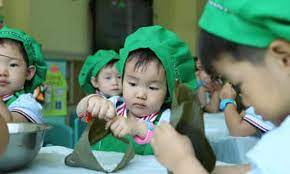HONG KONG (Reuters): Family planning authorities in the historic Chinese city of Xian texted residents this week wishing them “sweet love, marriage and childbirth”, and to create “good fertility”, in a new move to boost the country’s flagging birth rate.
The move aimed at encouraging people to have children comes after decades of “one-child policy” which disturbed the country’s demographics as the Chinese government is now trying to encourage young couples to have children, as an increasing number of women put off having children or opting to have none at all.
However, China isn’t alone in facing the low birth rate phenomenon. Last month, South Korea with the world’s lowest birth rate announced increasing financial support for marriage and home-buying and raise childcare subsidies, among other annual tax code revisions proposed by the finance ministry.
Many women cite the high cost of childrearing, difficulty in continuing on their career, gender discrimination and not wanting to get married as key factors for not wanting children.
The message was reported by local media, including on the official Weibo of China Newsweek, and coincided with the Qixi festival on Aug 22, also known as China’s Valentine’s Day, a traditional holiday celebrating love and romance.
It was sent by Xian’s Health Commission and Xian’s Family Planning Association. Both government departments did not immediately respond to requests for comment.
Reuters was not able to independently verify the message.
“Continue the blood of China and share the important task of rejuvenation,” the Weibo post on China Newsweek read. It added that marriage and childbearing should be done at the “right age” but did not give further details.
Official rules in China make it hard for single or unmarried women to have children out of wedlock but some provinces like Sichuan in the southwest have started liberalising laws in the past year to boost fertility levels.
Concerned about China’s first population drop in six decades and its rapidly ageing population, the government’s political advisors proposed in March that single and unmarried women should have access to egg freezing and in vitro fertilisation (IVF) treatment, among other services.
CHINESE PUZZLE
In 2022, China saw it shrank last year for the first time in more than six decades, official data showed Tuesday, as the world’s most populous nation faces a looming demographic crisis.
The nation of 1.4 billion has seen birth rates plunge to record lows as its workforce ages, in a rapid decline that analysts warn could stymie economic growth and pile pressure on strained public coffers.
The population stood at around 1.41 billion at the end of 2022, National Bureau of Statistics (NBS) reported, a decrease of 850,000 from the end of the previous year – number births 9.56 million and number of deaths 10.41 million.
It was in 1960 when China’s population had declined as the country battled the worst famine in its modern history, caused by the disastrous Mao Zedong agricultural policy known as the Great Leap Forward.
China ended its strict “one-child policy” –- imposed in the 1980 owing to fears of overpopulation – in 2016 and began allowing couples to have three children in 2021.
But that has failed to reverse the demographic decline amid soaring cost of living as well as a growing number of women in the workforce and seeking higher education.
Moreover, Chinese people are also “getting used to the small family because of the decades-long one-child policy”, Xiujian Peng, a researcher at Australia’s University of Victoria, had told AFP earlier this year.
It was reported by AFP that many local authorities have already launched measures to encourage couples to have children.
The southern megacity of Shenzhen, for example, now offers a birth bonus and allowances paid until the child is three years old.
A couple who has their first baby will automatically receive 3,000 yuan ($444), an amount that rises to 10,000 yuan for their third.
In the country’s east, the city of Jinan has since January 1, 2023 paid a monthly stipend of 600 yuan for couples that have a second child.







